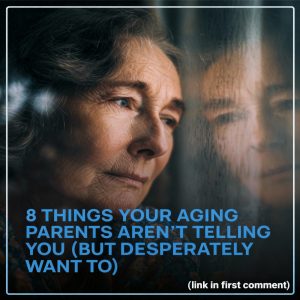**9 Signs Your Adult Children Secretly Resent How You Raised Them**
Raising children is one of life’s most difficult responsibilities, and no parent gets everything perfect. But as children grow into adults, they sometimes carry **unspoken hurt** from their upbringing. They may not say it directly — out of respect, fear of conflict, or simply because they haven’t processed their feelings yet.
If your adult child seems distant or emotionally guarded, it *doesn’t necessarily mean you were a bad parent.* It may simply mean there are unresolved feelings that need acknowledgment and empathy.
Here are **9 subtle signs** your adult child may carry resentment — and how to begin healing the relationship.
—
### **1. They Keep Conversations Surface-Level**
They talk about the weather, work, and small talk — but avoid emotional topics.
This often means they **don’t feel safe being vulnerable** around you.
*Healing approach:*
Ask open-ended, gentle questions like, *“How are you really feeling these days?”*
—
### **2. They Rarely Come to You for Advice**
If they always go to friends, partners, or siblings instead, it may be because they felt **dismissed, criticized, or unheard** growing up.
*Healing approach:*
Say: *“I’m here to listen — not to judge.”*
And keep that promise.
—
### **3. They Seem Defensive in Conversations**
If neutral conversations turn tense quickly, it could be a sign your child **still feels the need to protect themselves emotionally.**
*Healing approach:*
Speak slowly, without interrupting. Let them finish their thoughts fully.
—
### **4. They Avoid Discussing Childhood**
When mentions of the past cause silence or discomfort, it’s usually a sign of **unprocessed pain.**
*Healing approach:*
Never force the topic. Let them open the door when *they* are ready.
—
### **5. Their Boundaries Feel Extra Strong**
While boundaries are healthy, *rigid or unusually strict boundaries* can signal emotional wounds.
Example:
They insist on texting instead of calling, or limit how long you can visit.
*Healing approach:*
Respect the boundary.
Consistency builds trust.
—
### **6. They Get Easily Hurt by Your Comments**
Even harmless remarks may be taken the wrong way if they struggled with **criticism or high expectations** growing up.
*Healing approach:*
Replace advice with reassurance.
Say: *“I’m proud of you.”*
Often.
—
### **7. They Don’t Share Personal Life Details**
When a child hides relationship issues, struggles, or successes, it may be because they once felt **judged or misunderstood.**
*Healing approach:*
Respond with curiosity, not evaluation.
—
### **8. They Are Emotionally Distant, Even When Physically Present**
They show up to holidays but seem disconnected — laughing, but not *connecting.*
This usually signals a protective emotional wall.
*Healing approach:*
Spend time together doing simple activities — walking, cooking, playing a game.
Connection grows in small moments.
—
### **9. They Show Affection More Comfortably to Others**
If they are warm with friends but reserved with you, this can be painful to witness — but it’s also a **sign they learned emotional caution at home.**
*Healing approach:*
Offer affection *gently*, without expecting it to be returned immediately.
—
## **How to Begin Healing**
The most powerful thing a parent can say is:
> **“If I hurt you in ways I didn’t realize, I’m willing to listen. I care about your feelings.”**
Not to defend.
Not to explain.
Not to correct.
But to **listen.**
Healing happens when:
* Blame is replaced with understanding
* Silence is replaced with truth
* Pride is replaced with compassion
It’s never too late to rebuild a relationship.
Even small steps can change everything.





